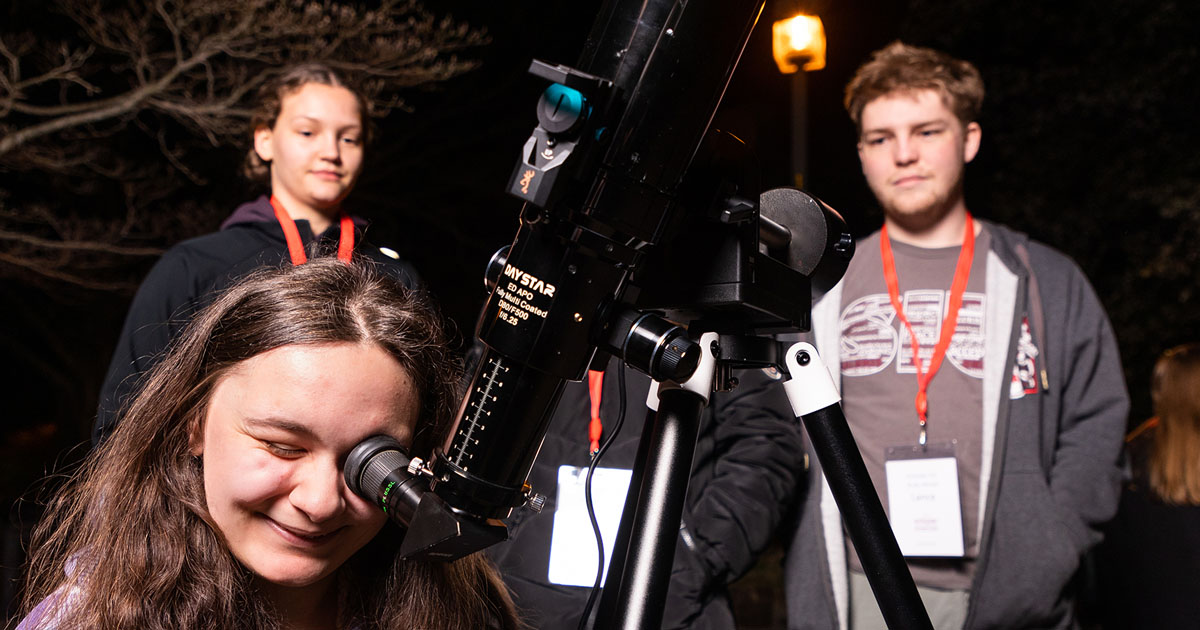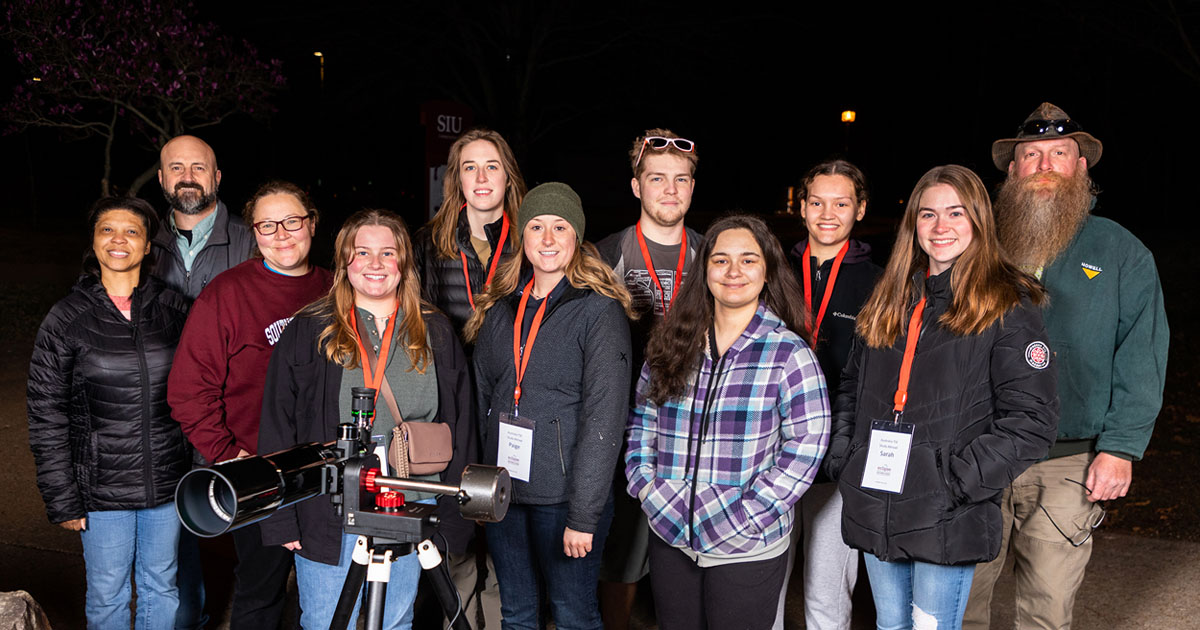
Lauren Ortiz, a senior in animal science, peers through the eyepiece of a telescope during a training session at Southern Illinois University Carbondale. Morgan Klover, left, a junior in civil engineering, and Lance Griswold, a junior in physics, look on.
April 06, 2023
SIU team to travel to Australia to study eclipse, prepare for 2024 event at home
CARBONDALE, Ill. – It’s going to get dark Down Under later this month, and Southern Illinois University Carbondale faculty, staff and students will be on the scene to study it when the moon obscures the sun, in a practice run for the 2024 total solar eclipse back home.
The research team and student study abroad teams will leave for Australia next week in preparation for the solar eclipse there on April 20. The SIU personnel plan to observe the event in Exmouth, a peninsula north of Perth and the only area in the path of the total eclipse there, said Cori Brevik, assistant professor of practice in the School of Physics & Applied Physics. Most of the western region of the country will experience a partial eclipse.
Brevik and Harvey Henson, director of SIU’s STEM Education Research Center, will travel with eight study abroad students, leaving April 13. The group will visit Shark Bay, Coral Bay, Carnarvon and Perth, as well, she said.
Bob Baer, specialist in the School of Physics & Applied Physics, will lead a four-person team of researchers leaving on April 11. The group, which includes two students, will conduct public outreach and night observation events prior to the eclipse.
Most of the group will leave Perth on April 22, arriving back in the U.S. on April 23.
Precious experience
Baer said the trip may be a once-in-a-lifetime opportunity for some students, who also will receive important, hands-on training and knowledge about observational astronomy along the way. The experience will allow them to take part in coronal data collection during the total solar eclipse that will hit Southern Illinois on April 8, 2024.
“The eclipse experience is something few will receive in their lifetime, and these students have the opportunity to do that twice,” Baer said. “Once in Australia and again during the upcoming total solar eclipse in the U.S.”
SIU faculty have trained students for the trip, during which they will test key imaging procedures and platforms for the Dynamic Eclipse Broadcast (DEB) Initiative and the Lunt Solar Systems multiwavelength telescope feeds. Both projects collect scientific data and will provide telescope feeds for NASA EDGE programming produced in cooperation with WSIU and SIU during the April 8, 2024, total solar eclipse, as well as the October 14, 2023, annular solar eclipse, which is when the moon passes between the sun and Earth at the nearest or farthest point of its orbit and does not completely cover the sun, Baer said.
It's a big job, with the students and researchers operating two specialized Lunt solar scopes that provide backup, geographically separated imagery to the mobile Lunt SunLab, which was on campus during the 2017 total solar eclipse and will be there again in 2024. The scopes provide stunning, high-resolution color solar images of the partial and total phases of the eclipses, and some of the best imagery possible from ground-based telescopes, Baer said.
A nation of scientists
The DEB initiative is a national citizen science project led by SIU to conduct coronal research throughout North America using volunteer observation teams. Baer and his team will test the DEB imaging setup in Australia. The test will provide essential feedback for imaging and training procedures that the students are helping to develop, Baer said.
“This trip is critical in ensuring we are prepared for the scientific and outreach components of our solar observations taking place across North America and at SIU,” Baer said. “It will expand our pool of experienced solar and nighttime astronomy observers who can assist with the massive outreach efforts we have planned at SIU.”
Studying abroad…and above
Prior to the April 20 event, students in the study abroad group will examine the stromatolites in Shark Bay, which are the oldest living organisms on Earth, and take a glass-bottom boat tour of Coral Bay. The visit will include snorkeling and views of the coral reef and turtles, hiking in the Outback, seeing new animals and viewing the skies of the southern hemisphere, Brevik said.
The students also will assist with a nighttime public astronomy viewing session in Carnarvon and Bullara before the eclipse, she said. They will participate in the research observations, as well as conduct outreach with Western Australia Astro Tourism.
Eclipse day is the big payoff, however. The students not only will observe the eclipse and help collect scientific data; they will interact with the general public and help answer questions about the event before and during the eclipse, Brevik said.
Brevik said the trip is an important dress rehearsal for SIU 2024.
“That day, the eclipse will last for only about 4 and a half minutes. There is little time to collect data and all the equipment needs to work correctly,” Brevik said. “This trip gives us an opportunity to practice collecting data during an eclipse and to iron out any equipment challenges.”

